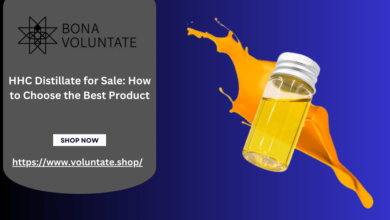
PROSOMA 500MG, also known by its generic name Carisoprodol, is a widely prescribed muscle relaxant that helps alleviate muscle pain and discomfort. It is commonly used in the treatment of acute musculoskeletal conditions. This article provides a detailed look at PROSOMA 500MG, including its uses, dosage, potential side effects, precautions, and more.
What is PROSOMA 500MG?
PROSOMA 500MG (Carisoprodol) is a prescription medication primarily used to treat pain and discomfort caused by muscle spasms, strains, and sprains. It belongs to a class of drugs known as muscle relaxants. PROSOMA works by blocking pain sensations between the nerves and the brain, providing relief from acute musculoskeletal pain. Although it can effectively ease muscle-related pain, it is not recommended for long-term use due to potential dependency and misuse.
How Does PROSOMA 500MG Work?
PROSOMA 500MG works by acting on the central nervous system. It helps to relax skeletal muscles by inhibiting the transmission of pain signals from the nerves to the brain. Reducing muscle spasms and tension provides relief from discomfort, enabling patients to recover more comfortably from injuries.
However, PROSOMA does not treat the underlying cause of muscle pain. It only provides symptomatic relief, helping individuals manage acute conditions like muscle strains, sprains, or injuries while they recover. Because of this, it is often prescribed alongside physical therapy or other forms of pain management.
Uses of PROSOMA 500MG
PROSOMA 500MG is prescribed for several conditions related to musculoskeletal pain, including:
- Acute Musculoskeletal Pain: This includes pain from injuries like sprains, strains, or muscle spasms.
- Muscle Relaxation: PROSOMA helps relieve tight, spasming muscles, improving mobility and comfort.
- Short-Term Use for Muscle Injury: It is typically used for short durations to help manage pain during the acute phase of muscle injuries.
Dosage and Administration
The recommended dosage of PROSOMA 500MG varies depending on the condition being treated, the patient’s health history, and the doctor’s instructions. However, the general guidelines are as follows:
- Adults: The usual dose is 250mg to 350mg three times daily and at bedtime. This dosage should not exceed 1400mg per day.
- Elderly Patients: They may be more sensitive to the effects of PROSOMA, and a lower dose may be prescribed.
The medication is usually taken orally with or without food. Patients should not take more than the prescribed amount, and the medication should not be used for extended periods, typically no longer than two or three weeks. Long-term use can lead to tolerance, dependence, or addiction.
Side Effects of PROSOMA 500MG
Like any medication, PROSOMA 500MG comes with potential side effects. Not everyone will experience these side effects, but some common and severe reactions include:
Common Side Effects:
- Drowsiness
- Dizziness
- Headache
- Nausea
- Vomiting
- Blurred vision
Serious Side Effects:
- Allergic reactions (rash, itching, swelling)
- Difficulty breathing
- Seizures
- Muscle weakness
- Heart problems (palpitations, irregular heartbeat)
If any of these serious side effects occur, patients should seek immediate medical attention. In addition, individuals should not drive or operate heavy machinery until they know how the medication affects them, as drowsiness is a common side effect.
Precautions and Warnings
Before using PROSOMA 500MG, patients should inform their healthcare provider about their medical history and any other medications they are taking, especially:
- Allergies: Any known allergies to Carisoprodol or related substances.
- Liver or Kidney Issues: Since PROSOMA is metabolized in the liver and excreted through the kidneys, individuals with liver or kidney problems may require a reduced dose.
- Pregnancy and Breastfeeding: The safety of PROSOMA during pregnancy and breastfeeding has not been fully established, so it should only be used if the benefits outweigh the risks.
- Alcohol or Drug Use: Combining PROSOMA with alcohol or other central nervous system depressants can increase the risk of side effects such as extreme drowsiness, dizziness, and respiratory depression.
- History of Substance Abuse: PROSOMA has the potential for abuse and dependence, and people with a history of substance abuse should avoid using this medication.
Drug Interactions
PROSOMA can interact with other medications, which may increase the risk of adverse effects. Some notable interactions include:
- CNS Depressants: Combining PROSOMA with alcohol, sedatives, or tranquilizers may result in excessive sedation and respiratory depression.
- Barbiturates and Benzodiazepines: These medications, often used for anxiety or sleep disorders, can have compounded sedative effects when taken with PROSOMA.
- Antidepressants: Certain antidepressants may increase the risk of drowsiness or dizziness when combined with PROSOMA.
Always consult with a healthcare provider before taking new medications to avoid harmful drug interactions.
Overdose of PROSOMA 500MG
Taking more than the prescribed amount of PROSOMA can lead to an overdose, which can be dangerous. Symptoms of an overdose may include:
- Extreme drowsiness
- Respiratory depression
- Weak or slow heart rate
- Seizures
- Loss of consciousness
If an overdose is suspected, seek immediate medical help. Treatment typically involves supportive care, such as monitoring vital signs and providing intravenous fluids, depending on the severity of the overdose.
Is PROSOMA 500MG Addictive?
PROSOMA 500MG has the potential for abuse and addiction, especially if used for long periods or in higher-than-prescribed doses. It is classified as a Schedule IV controlled substance, meaning that while it has legitimate medical uses, it can also be misused and lead to dependence. Therefore, PROSOMA should only be used for short durations, and patients should follow their doctor’s instructions carefully.
Alternatives to PROSOMA 500MG
For individuals who may be at risk of dependence or those who require long-term treatment for muscle pain, doctors may recommend alternative medications. These may include:
- Non-Steroidal Anti-Inflammatory Drugs (NSAIDs): Drugs like ibuprofen or naproxen can reduce pain and inflammation without the sedative effects of muscle relaxants.
- Physical Therapy: Engaging in targeted exercises under the guidance of a physical therapist can help strengthen muscles and reduce pain.
- Topical Analgesics: Creams or gels applied directly to the skin can provide localized pain relief.
Conclusion
PROSOMA 500MG (Carisoprodol) is an effective medication for managing acute musculoskeletal pain. It works by relaxing muscles and blocking pain signals from the brain, making it helpful in treating injuries like muscle strains, sprains, and spasms. However, due to its potential for dependence and side effects, it should only be used for short periods, and patients must follow their doctor’s recommendations closely.
It is important to remember that PROSOMA does not cure the underlying cause of muscle pain but only provides symptomatic relief. Patients should always consult with their healthcare provider to determine the most appropriate treatment for their condition.



